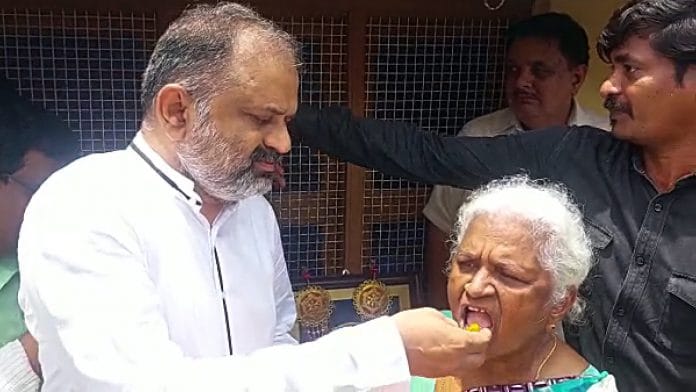New Delhi: A lecture scheduled to be delivered by A.G. Perarivalan, a convict in former prime minister Rajiv Gandhi’s assassination case, on 17 December was cancelled Wednesday due to threats of violence.
The lecture titled — ‘The Denial of Justice and A Quest Unfinished’ — was described as “Perarivalan’s story of struggle”, and was initially scheduled at the Asian College of Journalism (ACJ), Chennai. It was a part of the 5th Annual Lecture in Criminal Law (2022) of Project 39A, a criminal justice programme at National Law University (NLU), Delhi.
However, sources familiar with the event told ThePrint that the ACJ began receiving “threats of vandalism” soon after the announcement on 7 December. The physical lecture was, therefore, cancelled because the college was worried about the safety of its students.
The organisers then announced Tuesday that the lecture will be held online at 6 pm on 17 December.
“We are committed to Perarivalan’s freedom to share his experience searching for justice through 31 years of imprisonment,” the announcement read. It, however, asserted that “there have been serious threats of violence and vandalism to the venue over our choice of speaker”.
However, NLU authorities in Delhi began receiving threatening calls Tuesday evening after the announcement, ThePrint has learnt.
“With students still on campus (at NLU), it didn’t feel safe enough…There were threats to the campus and it made us quite worried about the safety and integrity of the campus…With students around, you choose safety over anything else,” a source aware of the development told ThePrint.
NLU then issued a circular on Wednesday, saying that the lecture was cancelled “due to unforeseen circumstances”.
In response to this, Executive Director of Project 39A, Anup Surendranath tweeted, “We lost this battle”.
We lost this battle. https://t.co/ckqM0tilRo
— Anup Surendranath (@asurendranath) December 14, 2022
ThePrint contacted the Registrar of NLU, Delhi, Professor Anupama Goel. However, she declined to comment.
From the assassination to now
Rajiv Gandhi was assassinated by a suicide bomber on 21 May 1991 at a rally in Sriperumbudur, Tamil Nadu. Perarivalan was 19 when he was arrested in June that year. He was accused of having bought two battery cells for Sivarasan, the LTTE (Liberation Tigers of Tamil Eelam) man who masterminded the conspiracy, which were used in the bomb that killed Rajiv.
On 28 January 1998, 26 people, including Perarivalan and fellow accused Nalini, were sentenced to death by a Chennai court. In May 1999, the Supreme Court upheld the death sentence handed to Perarivalan and three other convicts. Perarivalan, however, maintained that he had no knowledge about the alleged use of the nine-volt batteries that he supplied.
He remained on death row for 16 years, before the Supreme Court commuted his death sentence, along with two other convicts, to imprisonment for life in February 2014. This was after the court noted that successive Presidents took more than 11 years to decide on their mercy petitions.
Meanwhile, the CBI officer who recorded Perarivalan’s confession — which was the federal agency’s main evidence against him — told the Supreme Court in November 2013 that he did not record the confession accurately.
Perarivalan was released in May after the bench comprising Justices L.N. Rao and B.R. Gavai took note of his prolonged period of incarceration. In doing so, the court cited Article 142 of the Constitution, which grants it extraordinary powers for “doing complete justice in any cause or matter pending before it”.
(Edited by Theres Sudeep)
Also Read: UPA was Rajiv Gandhi Foundation’s golden past with donations, dignitaries. Then it lost swagger






